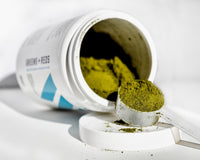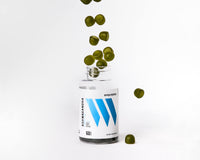When it comes to supplements it can be tough to figure out which ones you should take to meet your fitness goals. Both BCAAs and Creatine are derived from amino acids and help fuel athletic performance. But, there are some fundamental differences between BCAAs vs. Creatine that you should know, in order to make the right choice when it come to your training.
What Are BCAAs And What Do BCAAs Do?

Branched Chain Amino Acids or BCAAs are considered the building blocks of protein and are composed of the essential amino acids L-Leucine, Isoleucine, and Valine. BCAAs help increase the rate of protein synthesis and decrease the rate of protein breakdown. What does that mean for you? It means that BCAAs help you build more lean muscle mass while helping protect against muscle mass breakdown. During high-intensity training your body utilizes BCAAs as fuel during your workouts. When your body expends all of it’s branched-chain amino acids, it goes into an amino acid deficit, which then starts to break down muscle mass. It’s important to supplement with BCAAs so you keep a positive amino acid or protein balance to help build and rebuild lean muscle mass.
RELATED ARTICLE 4 Big Benefits Of BCAAS
BCAA Benefits In Summary
- Promoting Protein Synthesis
- Optimizing Post-Workout Recovery
- Reducing Exercise-Induced Muscle Soreness
- Increasing Lean Muscle Mass
RELATED ARTICLE The Ultimate Guide To BCAAs
What Is Creatine And What Does Creatine Do?
Creatine is a non-essential dietary protein-like compound, which can be obtained through your diet when eating lean proteins. Once ingested and inside the muscle cell, an energy phosphate molecule attaches itself to the creatine, turning it into phosphocreatine (PCr) or Creatine phosphate. Through this phosphorylation, Creatine then donates the PCr molecule to create ATP (Adenosine Triphosphate), which is then utilized by the muscle cells for rapid energy use and muscle contraction. Therefore, with more creatine in your muscle cells, you can generate more ATP. During high-intensity training, added ATP, leads to increased strength, power, and muscle growth.
As a supplement, Creatine Monohydrate (CrM) was first introduced in 1993 and has become one of the most widely studied and effective sports supplements shown to enhance exercise performance, promote muscle strength, and increase lean muscle mass. Studies have consistently shown that Creatine supplementation increases muscle phosphocreatine levels approximately 15-40%, enhances anaerobic training capacity and increases training volume.
However, despite the impressive clinical evidence in support of Creatine Monohydrates use for enhancing exercise performance, CrM does come with few drawbacks.
- Creatine Monohydrate can cause gastrointestinal issues such as bloating, stomach aches or cramping from converting creatine into creatinine (a toxic by-product of creatine conversion)
- Creatine Monohydrate requires a loading phase of 4-5 doses (typically 5 grams per dose) per day for up to 5 days and once a day thereafter.
- Creatine Monohydrate requires cycles, specifically 1 week of loading, 5 weeks of 4-5 weeks of maintenance, and 1-2 weeks off.
RELATED ARTICLE Pros And Cons Of Creatine Monohydrate
Creatine can be a bit confusing, considering there are so many types of creatine to choose from. However, research has shown that the only type of creatine which shows any performance differences, is Kre-Alkalyn a pH correct form of creatine monohydrate.What is Kre-Alkalyn?
 Kre-Alkalyn is a patented pH-corrected form of creatine, which was created to address the negative side effects associated with Creatine Monohydrate, namely the toxic conversion to creatinine. This was accomplished through adding an alkaline powder such as (soda ash, magnesium glycerol phosphate, bicarbonate) to ordinary creatine (i.e. Creatine Monohydrate, creatine citrate, creatine pyruvate, creatine phosphate) in order to adjust the pH balance between 7-14. Kre-Alklayn therefore solves the problem with all existing creatine supplements; the inability to deliver concentrated amounts of creatine without toxic conversion to creatinine. Therefore as compared to creatine monohydrate;
Kre-Alkalyn is a patented pH-corrected form of creatine, which was created to address the negative side effects associated with Creatine Monohydrate, namely the toxic conversion to creatinine. This was accomplished through adding an alkaline powder such as (soda ash, magnesium glycerol phosphate, bicarbonate) to ordinary creatine (i.e. Creatine Monohydrate, creatine citrate, creatine pyruvate, creatine phosphate) in order to adjust the pH balance between 7-14. Kre-Alklayn therefore solves the problem with all existing creatine supplements; the inability to deliver concentrated amounts of creatine without toxic conversion to creatinine. Therefore as compared to creatine monohydrate;
- Kre-Alkalyn is not degraded to creatinine which subsequently leads to greater bioavailability, meaning your body can use it more effectively
- Kre-Alkalyn solves for side effects such as bloating and cramping.
- 5 grams of Kre-Alkalyn is equivalent to about 10–15 grams of ordinary Creatine Monohydrate
- Kre-Alkalyn does do not require a loading phase or de-loading phase
- Kre-Alkalyn is clinically proven to enhance endurance, unlike Creatine Monohydrate
RELATED ARTICLE The Definitive Guide On Kre-Alkalyn Creatine
Kre-Alkalyn Creatine Benefits In Summary
- Proven gains in strength, speed, and performance
- Enhances VO2 Max for increased endurance
- Produces higher muscle force and power
RELATED ARTICLE Kre-Alkalyn Vs Creatine Monohydrate: The Best Form Of Creatine
What’s The Difference Between BCAAs and Creatine?
Now that you know how BCAAs and Creatine work, the biggest difference between BCAA vs Creatine is how each affects your athletic performance. BCAAs help build and rebuild lean muscle mass, while creatine helps increase your power output during high-intensity training to increase your strength and training volume. If your goals are to get stronger, clock faster times, or optimize recovery, using both BCAAs and Creatine together, will give you the best possible outcome to optimize your performance.
BCAAs Vs Creatine Frequently Asked Questions
Should I Take BCAAs Or Creatine?
The answer to your question is both! Both BCAAs and Creatine will help fuel your exercise performance, increase lean muscle mass, and power your workout or WOD, so that you can meet your goals and optimize your results.
When Should I Take BCAAs and Creatine?
BCAAs and Creatine should be taken before or during your workout to optimize your performance. The great thing about our BCAA and Kre-Alkalyn is that you can take them both at the same time and mix them together since our Kre-Alkalyn is unflavored. It’s the perfect lemon-lime mix to power your workout and quench your thirst.
Do I Need To Load Creatine?
One major difference between BCAAs and creatine monohydrate, is that creatine needs to be loaded. Loaded, meaning it needs to be taken in higher doses when you first start your supplement routine, to saturate the muscle tissue.
Loading creatine monohydrate will maximize creatine stores and availability up to 20% giving you more power output and strength during short bouts of exercise. The skeletal muscle within your body will store enough adenosine triphosphate (ATP) to produce approximately 10 seconds of high-intensity activity; more creatine content will lead to greater increases of strength and power output.
RELATED ARTICLE Do You Need To Load Creatine
Kre-alkalyn however, does not need to be loaded in order to maximize performance benefits and can be taken and used immediately, for better strength and endurance.
BCAAs Vs. Creatine: Takeaway
So, which one should you take BCAAs or Creatine? The answer is both! I'm just taking a guess here, but your goals probably fall in line with wanting to get stronger, increase performance, recover faster, and build more lean muscle mass. If that's the case, then taking both BCAAs and Creatine will help you get there faster, and produce better results.
Ready To Add Kre-Alkalyn To Your Supplement Regimen?
SWOLVERINE is an endurance athlete and active lifestyle brand. Made for the elite athlete, and the strong-willed our products were designed to fuel your athletic performance. We perform when you perform.
We believe that everyone can optimize not only their athletic performance but their human potential. The way we believe we can optimize performance is through transparency, clinically effective doses, and clinically proven ingredients with evidence-based outcomes. We provide the nutrients you need to power your active lifestyle.















